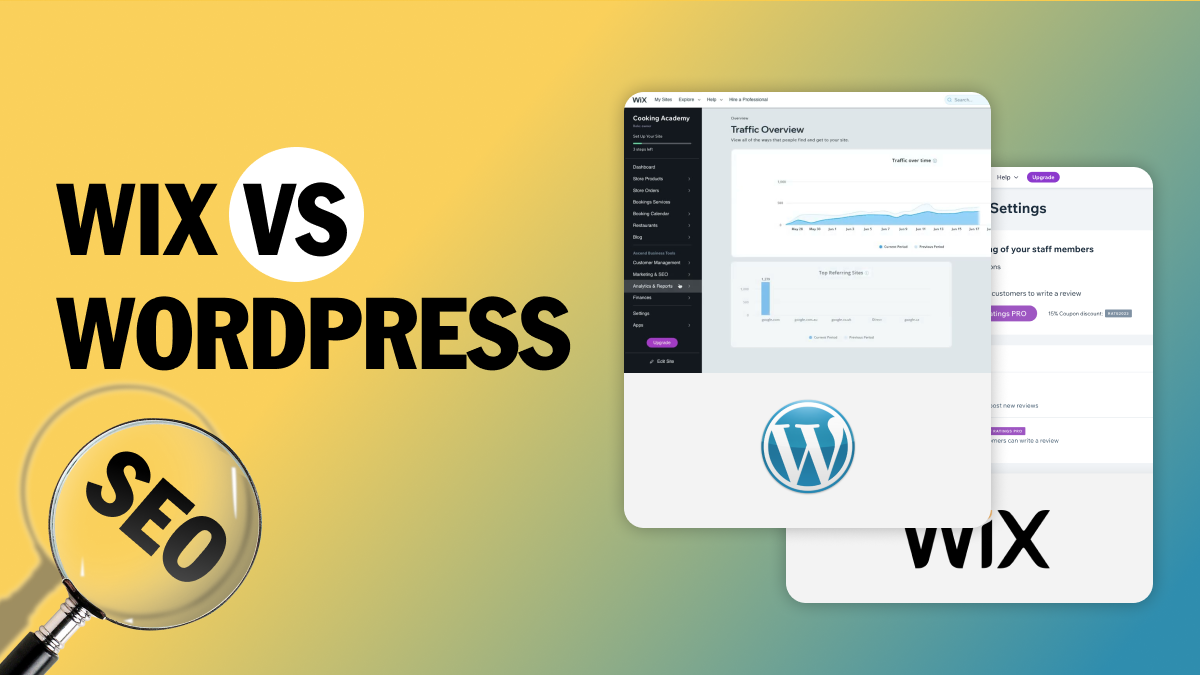When choosing a website builder, the SEO capabilities of the platform are a critical consideration for ensuring your site ranks well on search engines like Google and Bing. The ongoing debate between Wix and WordPress in terms of SEO prowess is significant for webmasters aiming for top search engine rankings. This post delves into the comparison between Wix vs WordPress SEO to ascertain which platform offers superior features.
SEO encompasses a range of strategies aimed at improving a website’s visibility on search engine results pages (SERPs). It’s divided into two primary categories: off-page SEO, which includes external optimization practices like link building and social media engagement, and on-page (or technical) SEO, focusing on site-specific enhancements such as code optimization and mobile responsiveness.
A robust website builder should facilitate both off-page and on-page SEO efforts, ensuring a holistic approach to search engine optimization.
Why Is SEO Important When Building a Website?
Search engine optimization (SEO) entails refining a website to achieve higher rankings on search engine results pages (SERPs), thereby improving its visibility to potential customers. In a digital landscape boasting over 1.7 billion websites, standing out is crucial.
Using the expertise of SEO service providers during website development can significantly enhance your site’s visibility and searchability from the outset.
Consider this: when was the last time you went beyond the first page of Google search results? If your site isn’t on that initial page, chances are it goes unnoticed. A well-optimized website not only attracts traffic but also facilitates conversions and online sales.
However, SEO goes beyond just search engine ranking; it’s also about enhancing user experience through responsive website design. With SEO optimization, navigating your website becomes smoother for users, making it easier for them to find relevant information. This, in turn, increases the likelihood of prolonged engagement and eventual customer conversion.
Now, you might be curious about the relevance of Wix vs WordPress SEO. The choice of the website-building platform significantly influences SEO outcomes. The critical question is: which platform, Wix or WordPress, is better for SEO? Both platforms have strengths and weaknesses in the realm of SEO, and the decision depends on individual needs and goals.
In comparing Wix and WordPress SEO, you’ll gain insights into each platform’s intricacies. By the end of this discussion, you’ll be better equipped to determine which platform aligns more closely with your SEO requirements. Now, let’s delve into the comparison!
WordPress vs. Wix: An Overview
Wix is designed as a user-friendly website builder, catering to those who prefer a straightforward approach to creating websites. It’s known for its drag-and-drop interface, making it accessible for users with minimal technical skills.
Wix has garnered a substantial user base, with over 180 million registered users, offering a range of built-in tools and features for website creation and management directly from its platform. While Wix provides a basic free plan, it includes on-site advertisements, and its premium plans commence at approximately $14 per month, offering more advanced features and removing ads.
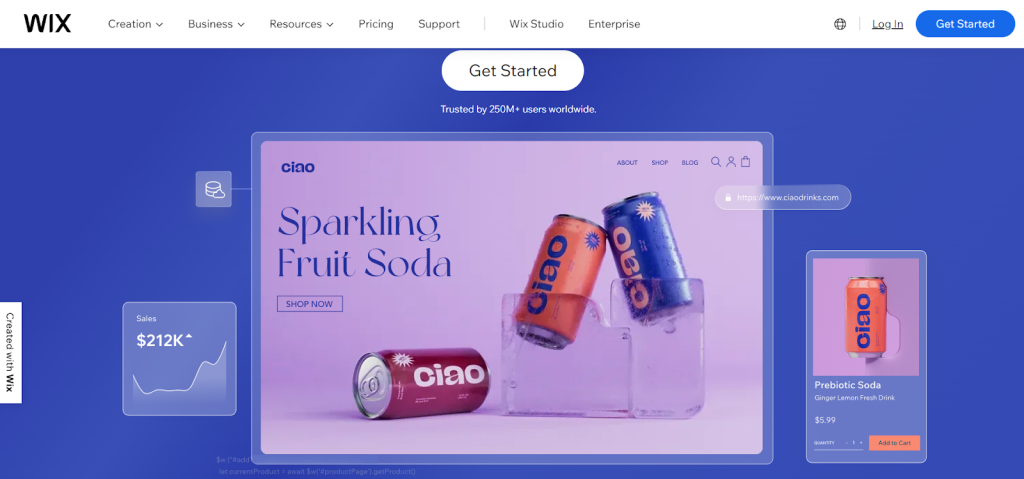
On the other hand, WordPress stands out as a robust content management system (CMS) favored for its extensive customization capabilities and content management features, ideal for handling complex sites such as business blogs, email lists, and multimedia content.
As an open-source platform, WordPress offers a high degree of flexibility, with a vast repository of themes and plugins exceeding 50,000, enabling users to tailor their sites to precise specifications. While the core WordPress software is free, users need to secure a domain name and web hosting to get their site up and running.
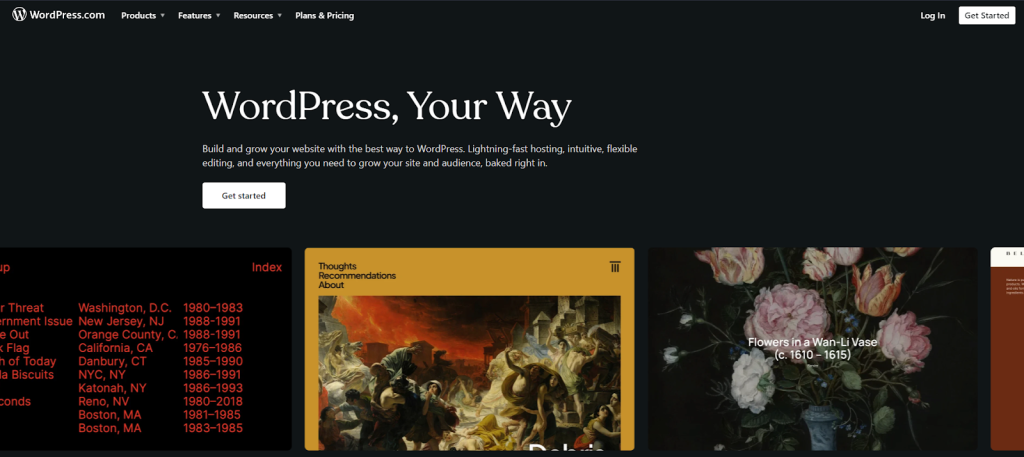
It’s important to note the distinction between WordPress.com and WordPress.org within the WordPress ecosystem:
- WordPress.com is a subscription-based website-building domain. To build and host your website, you need to create and use an account.
- WordPress.org provides complete control, with users responsible for hosting their site and utilizing all its open-source software, including various themes, plugins, and tools for website enhancement.
How Good Is Wix’s SEO?
Wix has made significant strides in becoming a user-friendly platform that simplifies website creation without requiring coding knowledge. Users can easily design their sites using a variety of templates and drag-and-drop elements, making the process quick and straightforward.

Off-Page SEO
To aid in off-page SEO efforts, Wix introduced the Wix SEO Wiz, a guided tool designed to help users formulate and implement effective SEO strategies for their websites. This tool offers keyword selection assistance and integrates seamlessly with essential services like Google Analytics and Google Search Console.
Wix also includes SEO functionalities within its dashboard under the ‘Get Found on Google’ feature, enhancing the site’s visibility on Google search results and offering a comprehensive approach to optimizing search engine presence.
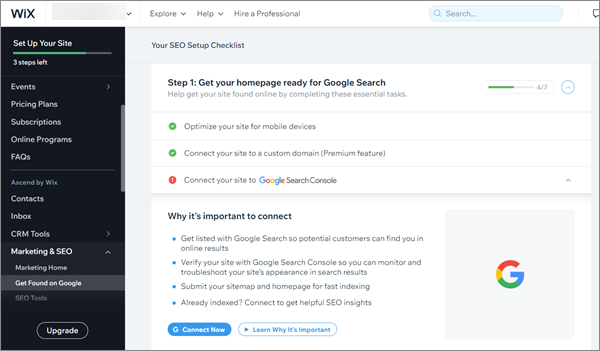
On-Page SEO
Wix offers a wide array of on-page SEO tools that address key elements such as meta titles, meta descriptions, headings, and customizable URLs. The platform allows for the personalization of image alt texts, the implementation of 301 redirects, and the addition of social media sharing features.
Key SEO functionalities in Wix also encompass SSL encryption, which is favored by search engines in their rankings. Wix provides the option to exclude certain pages from search engine indexing and offers seamless integration with Google Analytics and Google Search Console. Given the importance of mobile responsiveness in SEO, Wix’s design interface ensures easy modification of the mobile site layout to enhance user experience.
For those seeking advanced SEO features, Wix’s App Market includes a selection of both free and paid SEO applications. Among these, the ‘Site Booster’ app stands out by assisting in securing business listings across local directories and prominent search engines like Google, Yelp, Bing, and Yahoo.
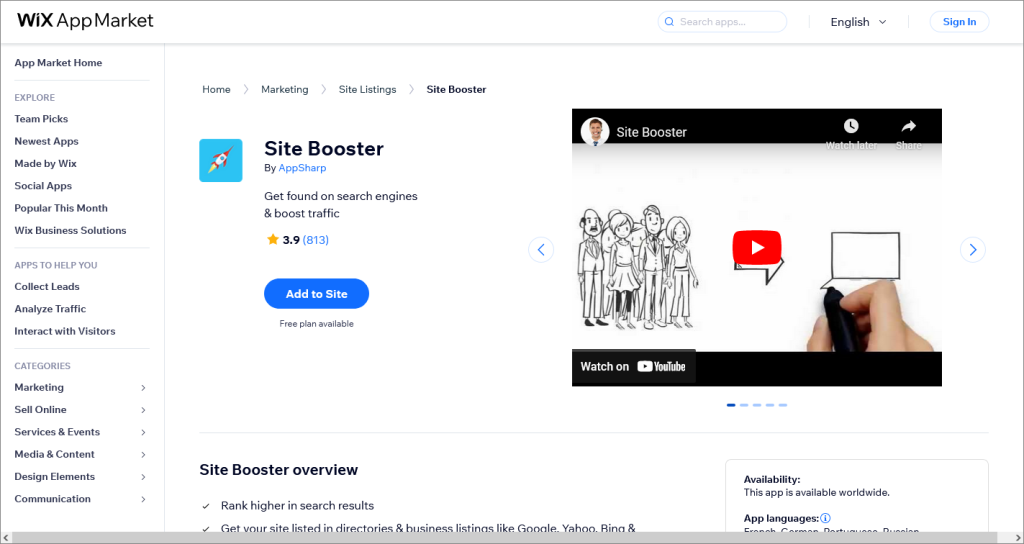
Wix’s Technical Drawbacks
Despite its user-friendly design capabilities, Wix faces certain technical challenges that can impact SEO performance:
- Wix utilizes a unique link structure that incorporates a “#” (hashbang) within URLs, rendered via JavaScript. This can complicate the process for search engines to crawl and index Wix sites effectively, potentially affecting search rankings.
- While Wix supports sitemap generation, users must rely on Google Search Console for sitemap management, indicating an area where Wix could improve its native SEO features.
- Wix’s HTML Code element presents limitations in adding or modifying custom code, which can be a constraint for users needing advanced customization for SEO purposes, such as during detailed site audits.
- Wix websites, known for their aesthetic appeal, often experience slower loading times compared to alternatives like WordPress. This can negatively impact SEO, as page speed is a critical factor in search engine algorithms.
Wix is renowned for enabling the creation of visually compelling websites with ease. However, when it comes to SEO, it’s important to recognize the platform’s limitations in terms of customization and technical SEO optimization. While recent improvements have been made to enhance Wix’s SEO features, potential users should consider these constraints carefully, especially if search engine visibility is a priority.
In summary, while Wix provides a user-friendly platform with a range of on-page SEO tools, it’s essential to weigh its visual design strengths against the potential SEO drawbacks. The decision to use Wix should be informed by a clear understanding of these trade-offs and how they align with your website’s goals and priorities.
How Good is WordPress’ SEO?
WordPress has evolved from its origins as a blogging platform to become a versatile tool that powers over 70 million websites. Its flexibility has made it suitable for a wide array of web functions, from e-commerce and business sites to web applications. Despite its expansion, WordPress remains open-source and free, making it an accessible option for those with programming skills and others who wish to leverage its extensive content publishing and indexing capabilities for better search engine visibility.
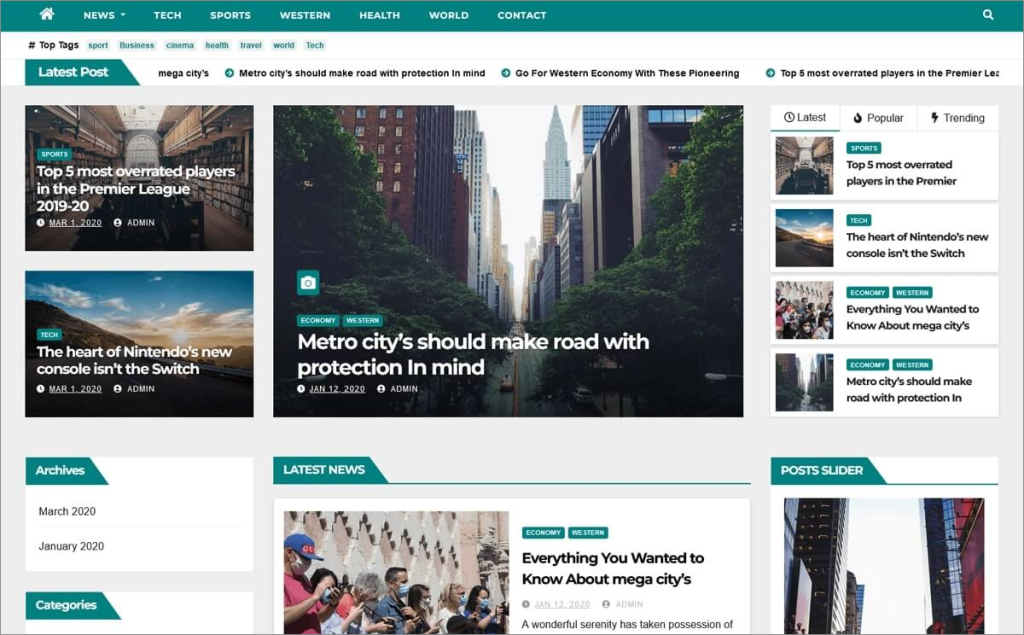
Off-Page SEO
One of the standout features of WordPress is its rich ecosystem of plugins designed to enhance off-page SEO efforts. These plugins facilitate various aspects of content optimization and distribution, ensuring that your website’s content is not only well-written but also structured in a manner that’s conducive to SEO.
Plugins like Yoast SEO are particularly noteworthy. They extend beyond basic functionalities like grammar checking and keyword density analysis. Yoast SEO, for example, guides users towards an SEO-optimized writing style, making recommendations that can improve the overall SEO health of your content.
Moreover, such plugins often include features that allow for easy integration with social media channels, Google Analytics, and Google Search Console, providing a comprehensive suite of tools to bolster your off-page SEO strategy directly within the WordPress dashboard.
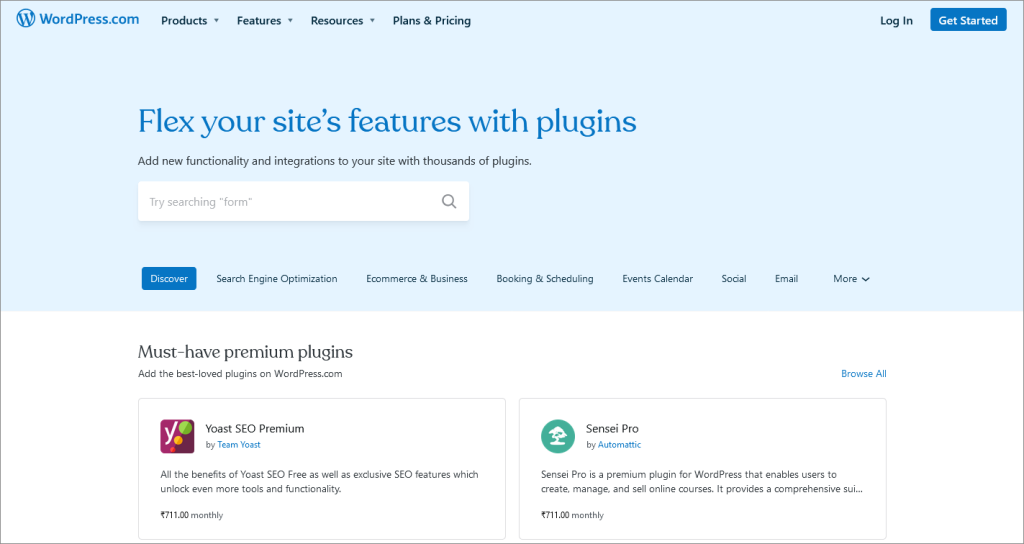
WordPress’s open-source nature and its extensive plugin repository make it a powerful platform for implementing both basic and advanced SEO strategies. Its capacity to adapt to various web functionalities, combined with user-friendly SEO tools, positions WordPress as a strong contender for those looking to optimize their website for search engines effectively. Whether you’re a seasoned developer or a content creator with minimal technical expertise, WordPress offers a range of options to enhance your site’s SEO and improve its visibility on search engine results pages.
On-Page SEO
WordPress is renowned for its extensive on-page SEO capabilities, enabling users to customize meta titles, headings, and tags to align with their SEO strategies. The platform’s wide array of plugins further enhances its SEO prowess, offering solutions for increasing page speed, optimizing images, and implementing effective caching mechanisms. These tools are instrumental in improving page load times, a critical factor in search engine rankings.
Key features include:
- Customization Tools: Users can easily adjust meta titles, headings, and tags for better SEO optimization.
- Speed Optimization Plugins: Available plugins can significantly enhance page loading speeds, a vital aspect of SEO.
- Link Management: WordPress offers tools to identify and fix broken links, which is crucial for maintaining site integrity and avoiding search engine penalties.
- Internal Linking: Some plugins can automate internal linking based on keywords, simplifying SEO maintenance.
- URL and Redirection Management: Plugins that organize URLs and manage 404 errors by implementing 301 redirects are readily available, aiding in site navigation and SEO.
- Mobile Optimization: With mobile responsiveness being a key ranking factor, WordPress provides solutions for optimizing sites for mobile users, including adaptable sliders. However, it’s worth noting that sliders can affect site speed and performance, particularly on mobile devices.
- Sitemap Generation: One-click plugins for sitemap creation and submission to search engines like Google streamline the site indexing process.
- URL Structure: WordPress maintains structured, logical URLs that can be categorized based on user preferences, adhering to SEO best practices.
- Code Customization: The platform allows for code modifications, enabling developers to implement specific SEO updates and customizations.
- Plugin Selection: More than 55,000 free and premium plugins are readily available for selection, enabling effortless website enhancement devoid of manual coding.
- Enhanced Control with WordPress: With WordPress offering extensive control, websites have an increased likelihood of securing higher rankings on SERPs.
- Speed Optimization: Is a website experiencing sluggish loading times? Implementing speed optimization tactics can substantially improve its performance.
- Yoast SEO Plugin: WordPress users globally utilize Yoast, the leading SEO plugin, with over five million websites leveraging its features for enhanced content visibility and improved rankings through internal linking and page redirection.
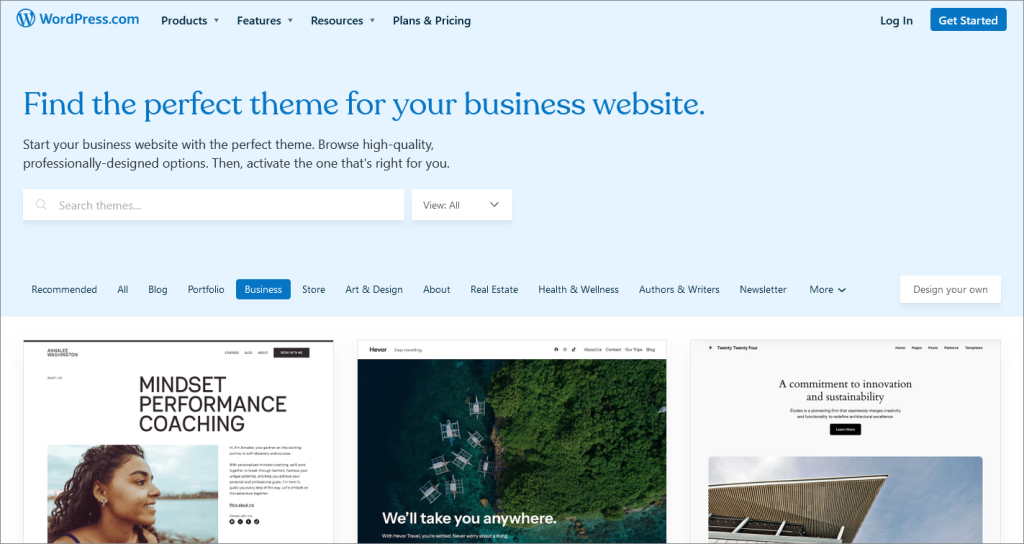
WordPress’s Technical Drawbacks
While WordPress offers a plethora of advantages for SEO, there are some technical considerations to keep in mind:
- Being open-source, WordPress lacks personalized support options, such as dedicated phone assistance, which can be a drawback for some users.
- The platform relies on a global community for support, which may not always provide immediate or personalized solutions to technical issues.
- Although WordPress is free to download, launching a website entails additional expenses for domain names and hosting services. Premium themes and plugins can further increase costs, potentially reaching $200 annually.
- The platform’s extensive customization options can be overwhelming for beginners, and the absence of a WYSIWYG editor can complicate the design process for those accustomed to more user-friendly interfaces like Wix’s drag-and-drop editor.
- WordPress templates may limit design flexibility, with each page conforming to a predetermined layout. Customizing themes to meet specific design requirements can be challenging without professional assistance.
Despite these considerations, WordPress remains a powerful and flexible platform for on-page SEO, offering a wide range of tools and plugins to optimize websites for search engines. Its ability to cater to both novice users and experienced developers makes it a popular choice for building SEO-friendly websites. However, it’s important to weigh the platform’s technical aspects and potential costs against its SEO benefits when choosing WordPress for your website.
Also Read: How to Do an SEO Audit for a WordPress Site!
WordPress vs Wix SEO: Which Is the Best?
When it comes to building a website with SEO in mind, the choice between WordPress and Wix is pivotal. Here are several key considerations to help you make an informed decision:
- Ease of Use: For those new to website creation, the ease of use is paramount. A platform that offers an intuitive interface simplifies the process of building an SEO-friendly website without extensive technical knowledge. While Wix is known for its user-friendly drag-and-drop editor, WordPress also offers a range of themes and plugins that, with a slight learning curve, can be highly effective for SEO.
- Customization Options: The ability to customize your website is crucial for SEO success. WordPress excels in this area with its vast library of themes and plugins, allowing for deep customization of both design and functionality to adhere to SEO best practices. Wix also offers a range of templates and design options, though with some limitations compared to the extensive customization available in WordPress.
- Mobile Optimization: With the majority of web traffic now coming from mobile devices, a platform that ensures your website is mobile-friendly is essential. Both Wix and WordPress offer responsive design options, but WordPress’s extensive themes and plugins provide more flexibility in optimizing for mobile users.
- Page Speed: Website loading speed is a critical factor for both user experience and SEO. WordPress offers a variety of optimization plugins that can significantly improve website speed. Wix has made improvements in this area but may still lag behind WordPress in terms of the speed optimization possibilities offered by third-party plugins.
- SEO Features: Built-in SEO tools can greatly enhance your website’s visibility on search engines. Wix offers a straightforward approach with its Wix SEO Wiz tool, providing basic SEO features. WordPress, with plugins like Yoast SEO, offers a more comprehensive set of tools for detailed SEO management, from meta tags to content analysis.
- Security: Ensuring your website is secure is vital for maintaining user trust and SEO rankings. WordPress, with its regular updates and vast array of security plugins, can provide a high level of security. Wix also offers robust security features, handling many aspects of website security behind the scenes.
- Scalability: As your business grows, so should your website. WordPress is renowned for its scalability, easily accommodating the growth of your site with additional pages, posts, and functionalities. Wix can support growth to some extent, but may not offer the same level of scalability as WordPress.
- Support: Access to reliable support can be a deciding factor, especially for those less experienced in web development. Wix provides structured customer support, while WordPress relies on a vast community for troubleshooting, alongside numerous online resources and forums.
Both Wix and WordPress have their merits depending on your specific needs, skills, and SEO goals. For users seeking simplicity and an all-in-one package, Wix is a strong contender. However, for those who prioritize extensive customization, advanced SEO capabilities, and scalability, WordPress stands out as the superior choice.
Ultimately, WordPress aligns more closely with the key factors for successful SEO optimization, making it a preferred option for individuals and businesses aiming to establish a robust online presence.
Also Read: How To Setup Google Analytics 4 For Your WordPress Website
SEO Factors To Consider When Choosing A Website Building Platform
Choosing the right platform holds significant importance in optimizing a website for search engines. Here are key factors to consider when deciding which website-building platform to use for SEO purposes:
- User-Friendly Interface: Opt for a platform that offers ease of use, especially for beginners. A simple navigation system makes it easier to create an SEO-friendly website without requiring advanced technical skills.
- Customization Abilities: Look for platforms with extensive customization options to tailor the design and functionality of your website according to your needs. Platforms that allow ample customization make SEO optimization more effective.
- Mobile Responsiveness: With mobile devices dominating internet traffic, ensuring your website is responsive across all devices is crucial for SEO. Platforms that prioritize mobile optimization ensure accessibility and responsiveness.
- Page Loading Speed: Fast loading times are essential for both user experience and SEO. Choose platforms that prioritize page speed to improve your website’s search engine rankings.
- Built-In SEO Tools: Seek platforms equipped with built-in SEO tools like meta tags, sitemaps, and keyword research functionalities. These tools simplify the process of optimizing your website’s content for search engines.
- Security Measures: Maintaining website security is vital for user trust and search engine rankings. Select platforms that offer secure hosting, SSL certificates, and other security features to protect your website against cyber threats.
- Scalability: As your website grows, opting for a scalable platform is crucial. Choose platforms that allow seamless addition of new pages, features, and functionalities to accommodate business expansion.
- Customer Support: Prioritize platforms that offer reliable customer support to promptly address any technical issues. This ensures consistent SEO performance and minimizes negative impacts on search engine rankings.
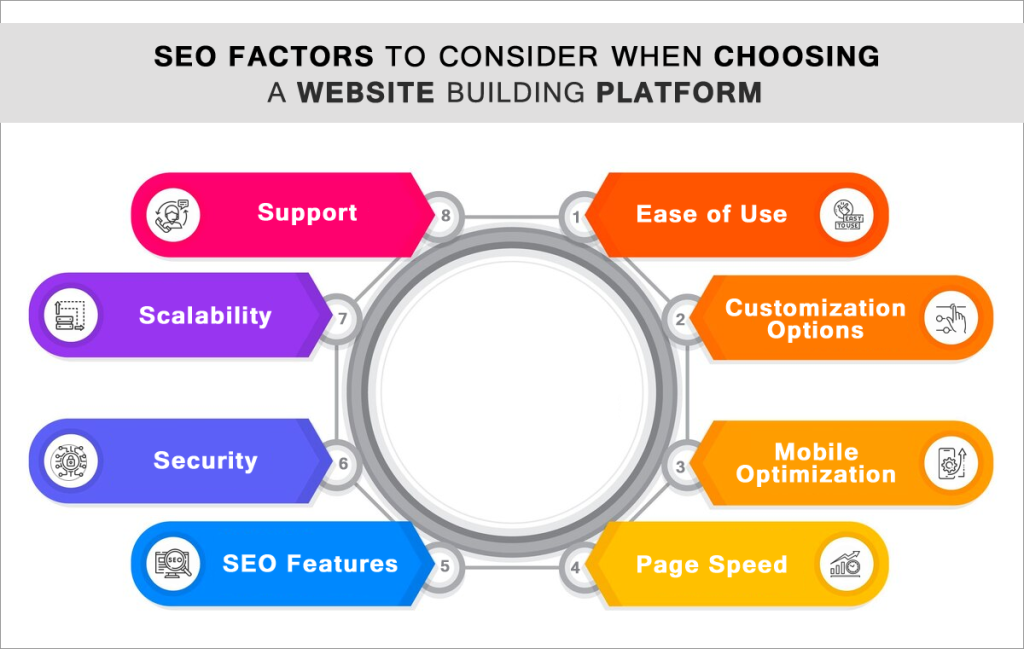
Wix vs WordPress SEO – Conclusion
When it comes to enhancing your website’s search engine performance, the choice between Wix and WordPress is pivotal. Both platforms come equipped with a suite of SEO features designed to boost your site’s visibility on search engines.
Wix stands out for its ease of use, offering a user-friendly drag-and-drop builder and integrated SEO tools, making it an ideal choice for beginners. Conversely, WordPress caters to those seeking deeper customization through its extensive range of SEO plugins and a vibrant community of developers and users.
The decision between Wix and WordPress for SEO ultimately hinges on your specific needs and what you value most in a website builder. If simplicity and a streamlined approach are your priorities, Wix might be the way to go. For those who desire comprehensive control and customization over their SEO strategy, WordPress offers a more versatile solution.
Before settling on a platform, consider your objectives, technical proficiency, and budget. Opting for the platform that best aligns with your requirements can significantly enhance your site’s SEO, drawing more organic traffic and boosting your online presence.
FAQs
What is the primary difference between Wix SEO and WordPress SEO?
The key difference lies in their foundational structures; Wix is an all-inclusive website builder with native SEO tools, while WordPress is a content management system that leverages plugins for extensive SEO capabilities.
Which platform provides better customization for SEO settings?
WordPress typically offers broader customization for SEO, thanks to plugins like Yoast SEO and Rank Math, which provide detailed control over on-page SEO elements and metadata.
Are there built-in SEO features in Wix, and how do they compare to WordPress plugins?
Wix includes built-in SEO tools for optimizing basic elements like meta tags and headings. While these tools are convenient, they may not offer the same depth of customization and analytics as WordPress plugins.
In terms of performance, which platform is better for SEO?
Both Wix and WordPress can achieve strong SEO performance when properly optimized. WordPress might have a slight edge due to its extensive range of optimization plugins, but Wix’s integrated features also lay a solid foundation for effective SEO.
Which platform provides better support for content creation and SEO integration?
WordPress is renowned for its powerful content creation capabilities and seamless SEO plugin integration, offering extensive versatility for complex content strategies. Wix provides user-friendly content creation tools, but some users may find WordPress’s flexibility more conducive to advanced SEO integration.
Can I migrate my SEO settings from one platform to another?
Migrating SEO settings between Wix and WordPress, or vice versa, is possible but can be complex. It often requires manual adjustments, such as updating meta tags and setting up redirects. Although migration tools and plugins can assist with this process, careful attention is needed to ensure a smooth transition.
